
ToolUniverse
Democratizing AI scientists with ToolUniverse
Stars: 1025
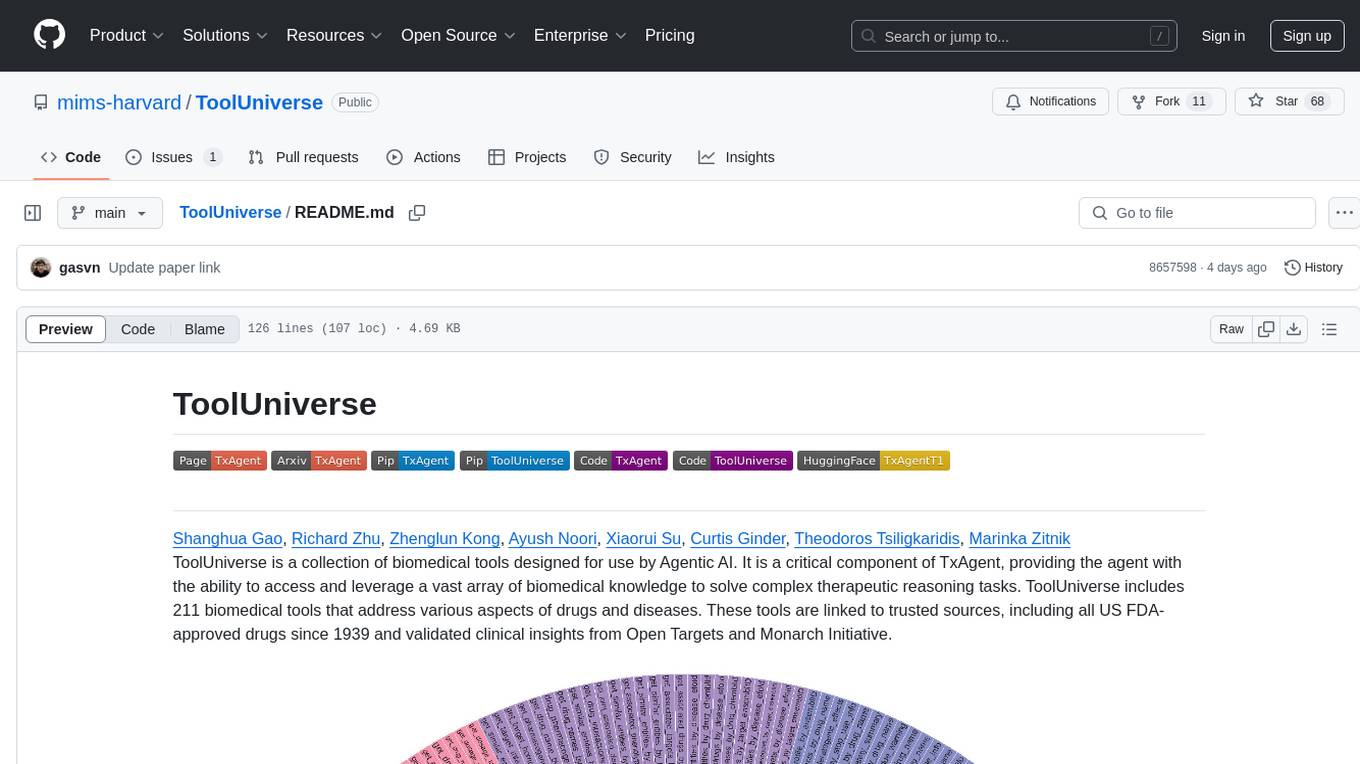
ToolUniverse is a collection of 211 biomedical tools designed for Agentic AI, providing access to biomedical knowledge for solving therapeutic reasoning tasks. The tools cover various aspects of drugs and diseases, linked to trusted sources like US FDA-approved drugs since 1939, Open Targets, and Monarch Initiative.
README:
AI agent (recommended) — open your AI agent and run:
Read https://aiscientist.tools/setup.md and set up ToolUniverse for me.
The agent will walk you through MCP configuration, API keys, skill installation, and validation.
or set up manually
Add to your MCP config file:
{
"mcpServers": {
"tooluniverse": {
"command": "uvx",
"args": ["--refresh", "tooluniverse"],
"env": {"PYTHONIOENCODING": "utf-8"}
}
}
}
Install agent skills:
npx skills add mims-harvard/ToolUniverse
Python developers — install the SDK:
uv pip install tooluniverse
Click to watch the demo (YouTube) (Bilibili)
ToolUniverse is an ecosystem for creating AI scientist systems from any large language model. Powered by the AI-Tool Interaction Protocol, it standardizes how LLMs identify and call tools, integrating more than 1000 machine learning models, datasets, APIs, and scientific packages for data analysis, knowledge retrieval, and experimental design.
Key features:
- AI-Tool Interaction Protocol: Standardized interface governing how AI scientists issue tool requests and receive results
- Universal AI Model Support: Works with Claude, GPT, Gemini, Qwen, Deepseek, and open models
- MCP Integration: Native Model Context Protocol server with configurable transport and tool selection
- Async Operations: Long-running tasks (protein docking, molecular simulations) with progress tracking and parallel execution
- Tool Composition: Chain tools for sequential or parallel execution in self-directed workflows
- Compact Mode: Reduces 1000+ tools to 4-5 core discovery tools, saving ~99% context window
- Agent Skills: 66 pre-built research workflows for drug discovery, precision oncology, rare disease diagnosis, pharmacovigilance, and more
- Literature Search: Unified search across PubMed, Semantic Scholar, ArXiv, BioRxiv, Europe PMC, and more
- Two-Tier Result Caching: In-memory LRU + SQLite persistence with per-tool fingerprinting for 10x speedup, offline support, and reproducibility
- Continuous Expansion: Register new tools locally or remotely without additional configuration
Building your project with ToolUniverse? Submit via GitHub Pull Request or contact us.
TxAgent: AI Agent for Therapeutic Reasoning [Project] [Paper] [PyPI] [GitHub] [HuggingFace]
TxAgent leverages ToolUniverse's scientific tool ecosystem to solve complex therapeutic reasoning tasks.
Medea: An Omics AI Agent for Therapeutic Discovery [Project] [Paper] [GitHub]
Medea integrates ToolUniverse tools for multi-omics analysis to identify therapeutic targets and predict drug responses across cancer, autoimmune, and other diseases.
Full documentation: zitniklab.hms.harvard.edu/ToolUniverse
Shanghua Gao, the lead creator of this project, is currently on the job market.
Slack · GitHub Issues · Shanghua Gao · Marinka Zitnik
Leaders: Shanghua Gao · Marinka Zitnik
Contributors: Shanghua Gao · Richard Zhu · Pengwei Sui · Zhenglun Kong · Sufian Aldogom · Yepeng Huang · Ayush Noori · Reza Shamji · Krishna Parvataneni · Theodoros Tsiligkaridis · Marinka Zitnik
@article{gao2025democratizingaiscientistsusing,
title={Democratizing AI scientists using ToolUniverse},
author={Shanghua Gao and Richard Zhu and Pengwei Sui and Zhenglun Kong and Sufian Aldogom and Yepeng Huang and Ayush Noori and Reza Shamji and Krishna Parvataneni and Theodoros Tsiligkaridis and Marinka Zitnik},
year={2025},
eprint={2509.23426},
archivePrefix={arXiv},
primaryClass={cs.AI},
url={https://arxiv.org/abs/2509.23426},
}
@article{gao2025txagent,
title={TxAgent: An AI Agent for Therapeutic Reasoning Across a Universe of Tools},
author={Shanghua Gao and Richard Zhu and Zhenglun Kong and Ayush Noori and Xiaorui Su and Curtis Ginder and Theodoros Tsiligkaridis and Marinka Zitnik},
year={2025},
eprint={2503.10970},
archivePrefix={arXiv},
primaryClass={cs.AI},
url={https://arxiv.org/abs/2503.10970},
}
For Tasks:
Click tags to check more tools for each tasksFor Jobs:
Alternative AI tools for ToolUniverse
Similar Open Source Tools

ToolUniverse
ToolUniverse is a collection of 211 biomedical tools designed for Agentic AI, providing access to biomedical knowledge for solving therapeutic reasoning tasks. The tools cover various aspects of drugs and diseases, linked to trusted sources like US FDA-approved drugs since 1939, Open Targets, and Monarch Initiative.
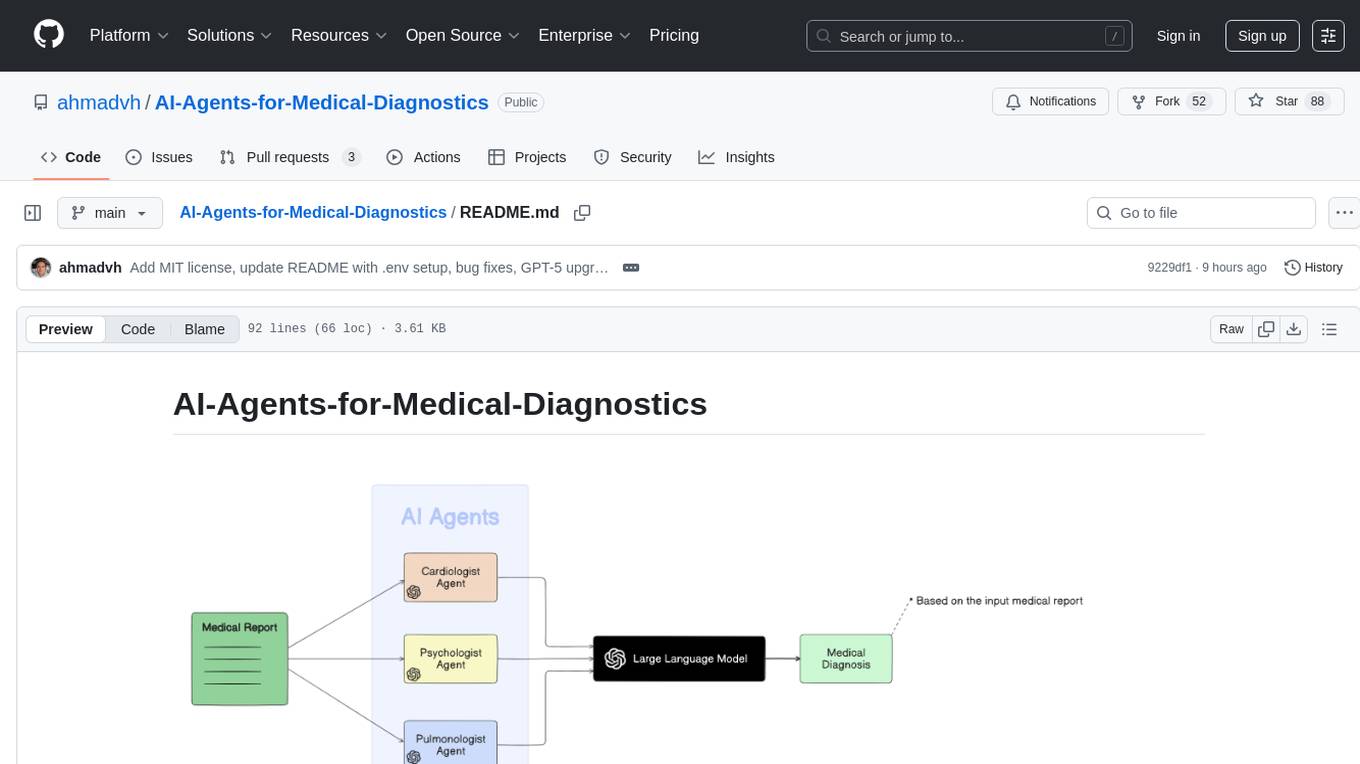
AI-Agents-for-Medical-Diagnostics
AI Agents for Medical Diagnostics is a repository containing a collection of machine learning models and algorithms designed to assist in medical diagnosis. The tools provided in this repository are specifically tailored for analyzing medical data and making predictions related to various health conditions. By leveraging the power of artificial intelligence, these agents aim to improve the accuracy and efficiency of diagnostic processes in the medical field. Researchers, healthcare professionals, and data scientists can benefit from the resources available in this repository to develop innovative solutions for diagnosing illnesses and predicting patient outcomes.
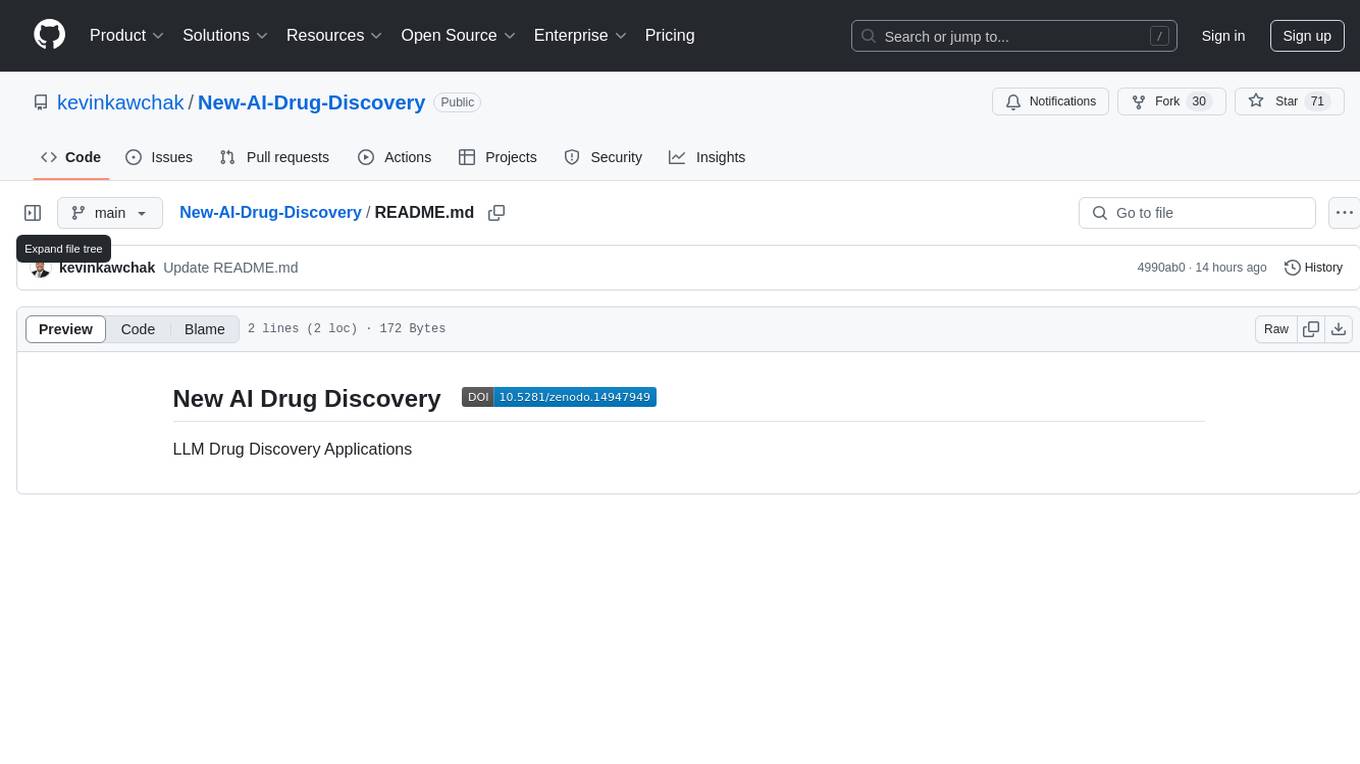
New-AI-Drug-Discovery
New AI Drug Discovery is a repository focused on the applications of Large Language Models (LLM) in drug discovery. It provides resources, tools, and examples for leveraging LLM technology in the pharmaceutical industry. The repository aims to showcase the potential of using AI-driven approaches to accelerate the drug discovery process, improve target identification, and optimize molecular design. By exploring the intersection of artificial intelligence and drug development, this repository offers insights into the latest advancements in computational biology and cheminformatics.
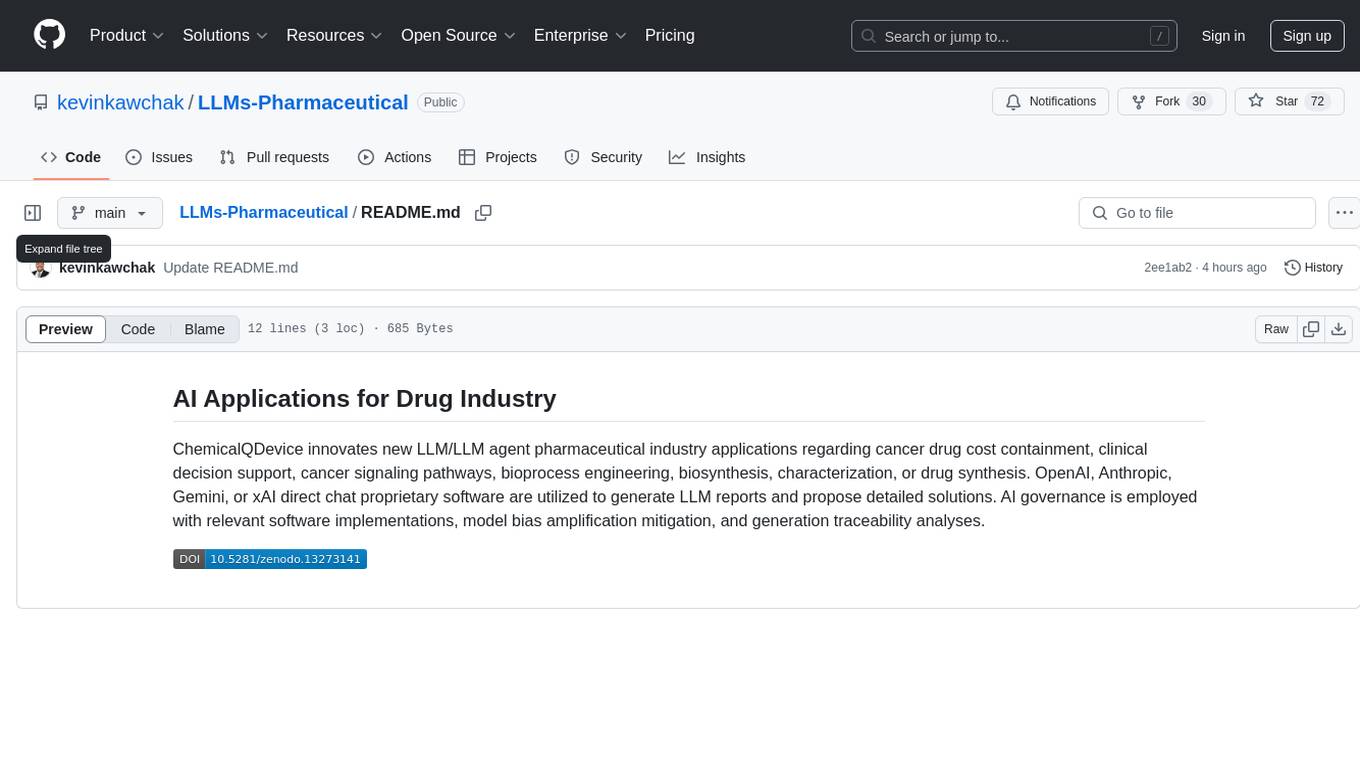
LLMs-Pharmaceutical
ChemicalQDevice innovates new LLM/LLM agent pharmaceutical industry applications regarding cancer drug cost containment, clinical decision support, cancer signaling pathways, bioprocess engineering, biosynthesis, characterization, or drug synthesis. OpenAI, Anthropic, Gemini, or xAI direct chat proprietary software are utilized to generate LLM reports and propose detailed solutions. AI governance is employed with relevant software implementations, model bias amplification mitigation, and generation traceability analyses.

nmed2024
Nmed2024 is a GitHub repository that contains code for a neural network model designed for medical image analysis. The repository includes scripts for training the model, as well as pre-trained weights for quick deployment. The model is specifically tailored for detecting abnormalities in medical images, such as tumors or fractures. It utilizes deep learning techniques to achieve high accuracy and can be easily integrated into existing medical imaging systems. Researchers and developers in the healthcare industry can leverage this tool to enhance the efficiency and accuracy of medical image analysis tasks.
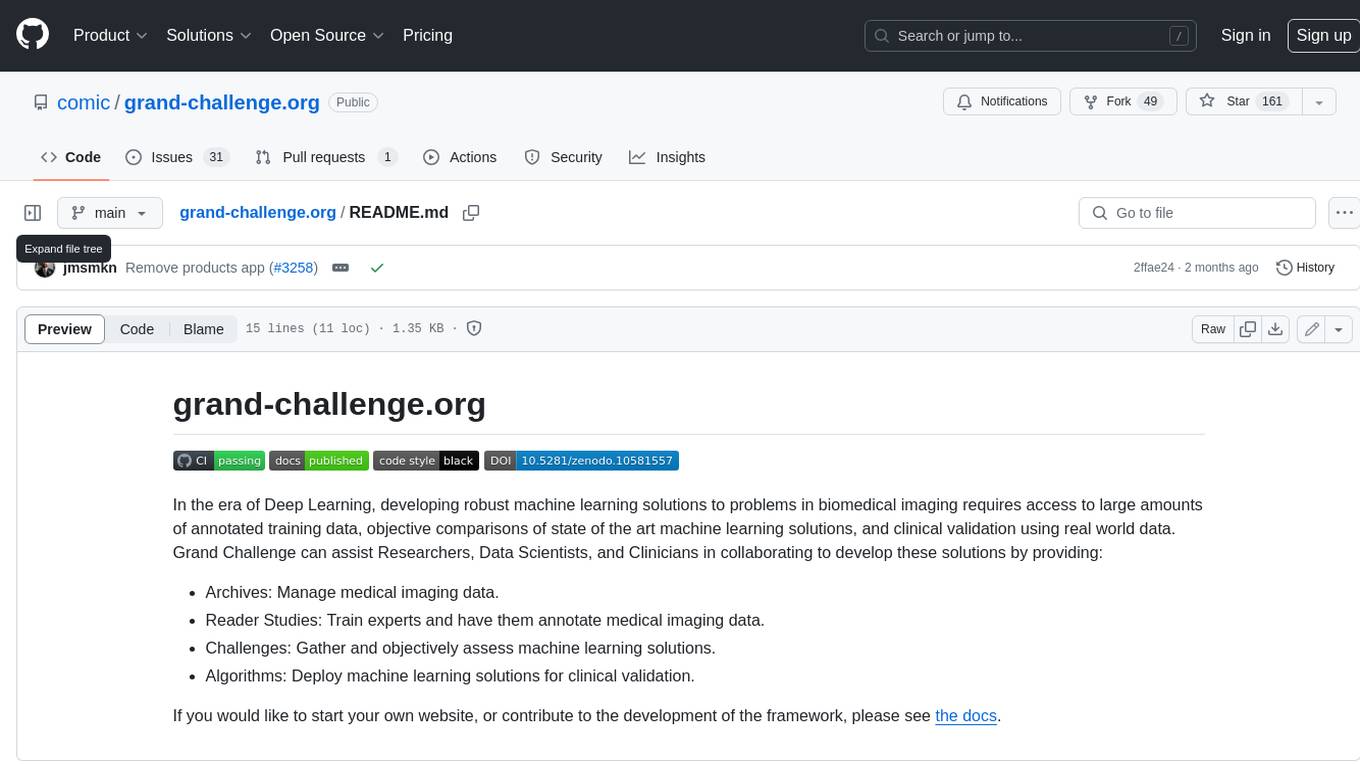
grand-challenge.org
Grand Challenge is a platform that provides access to large amounts of annotated training data, objective comparisons of state-of-the-art machine learning solutions, and clinical validation using real-world data. It assists researchers, data scientists, and clinicians in collaborating to develop robust machine learning solutions to problems in biomedical imaging.
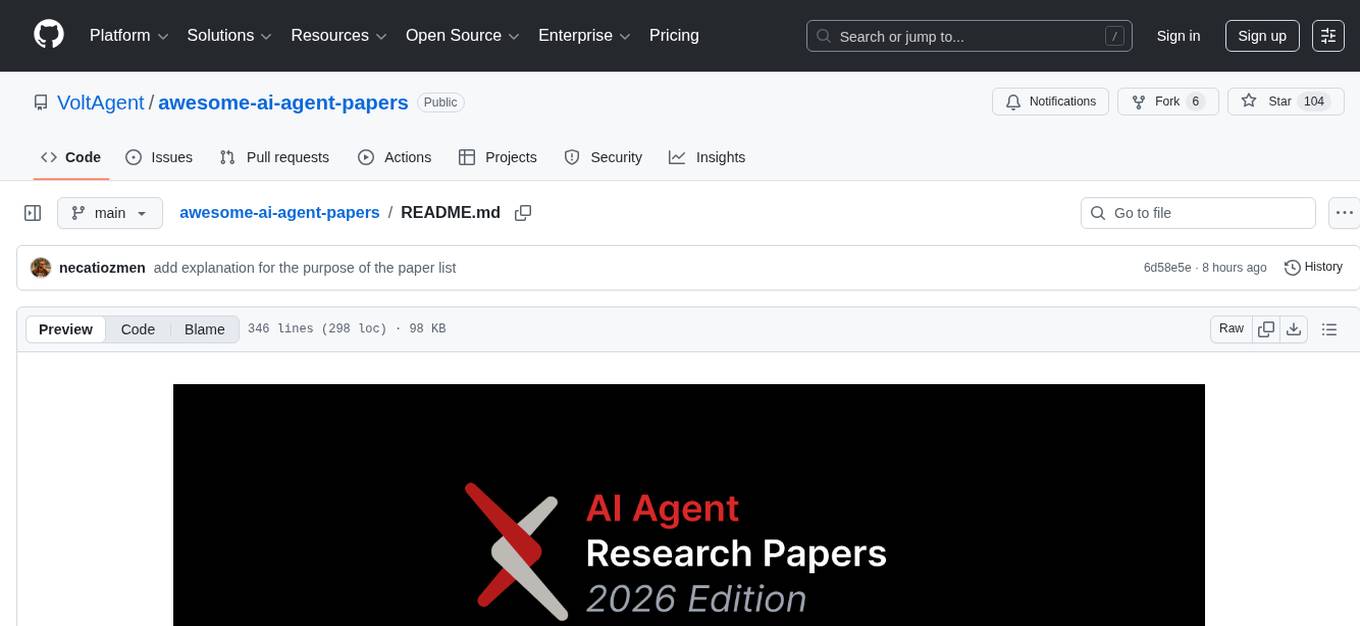
awesome-ai-agent-papers
This repository contains a curated list of papers related to artificial intelligence agents. It includes research papers, articles, and resources covering various aspects of AI agents, such as reinforcement learning, multi-agent systems, natural language processing, and more. Whether you are a researcher, student, or practitioner in the field of AI, this collection of papers can serve as a valuable reference to stay updated with the latest advancements and trends in AI agent technologies.
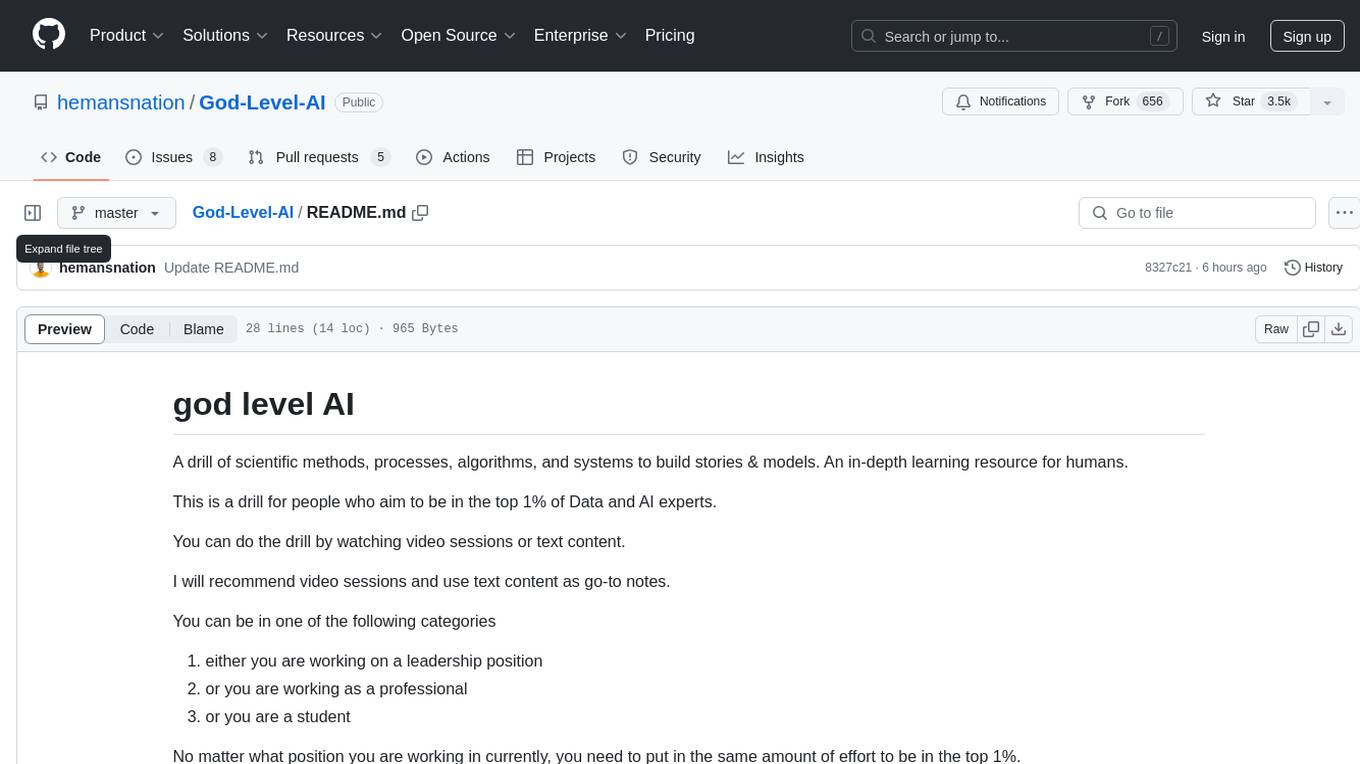
God-Level-AI
A drill of scientific methods, processes, algorithms, and systems to build stories & models. An in-depth learning resource for humans. This repository is designed for individuals aiming to excel in the field of Data and AI, providing video sessions and text content for learning. It caters to those in leadership positions, professionals, and students, emphasizing the need for dedicated effort to achieve excellence in the tech field. The content covers various topics with a focus on practical application.
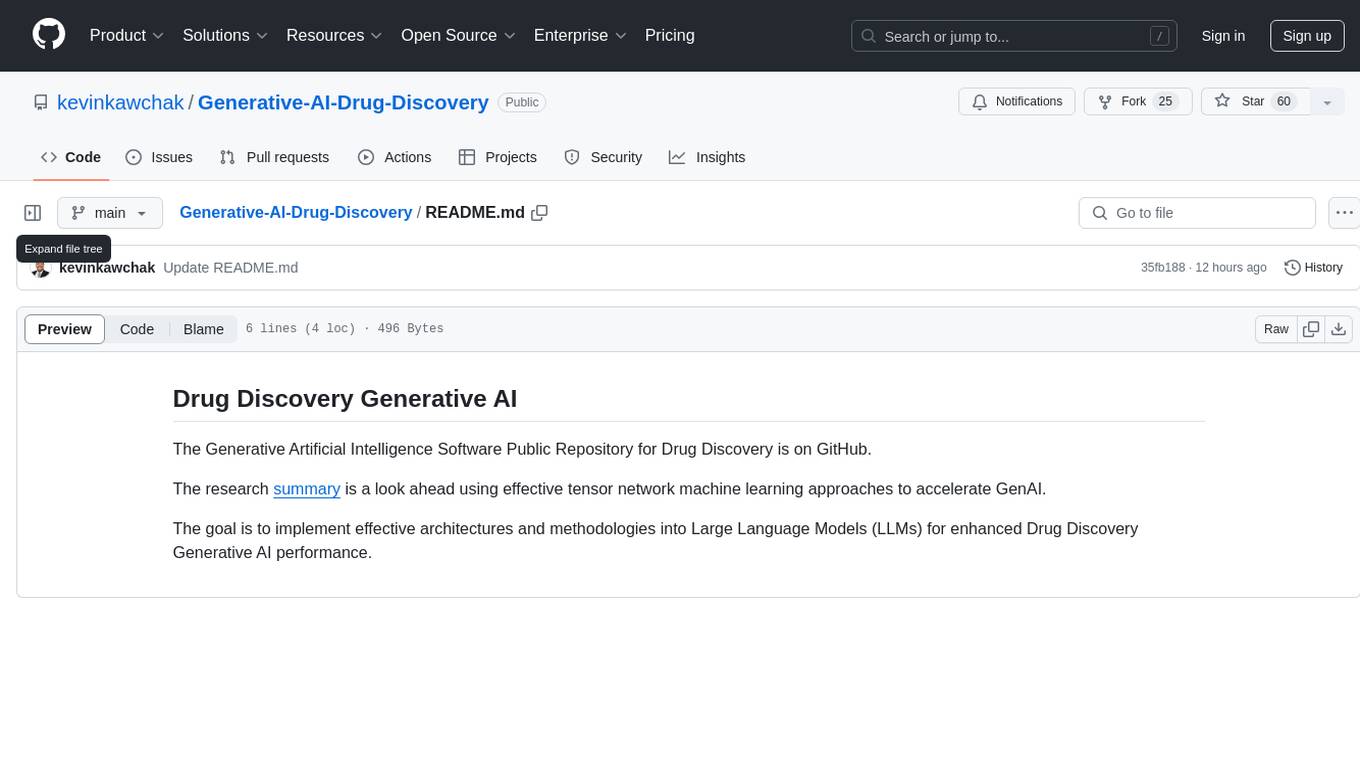
Generative-AI-Drug-Discovery
Generative-AI-Drug-Discovery is a public repository on GitHub focused on using tensor network machine learning approaches to accelerate GenAI for drug discovery. The repository aims to implement effective architectures and methodologies into Large Language Models (LLMs) to enhance Drug Discovery Generative AI performance.
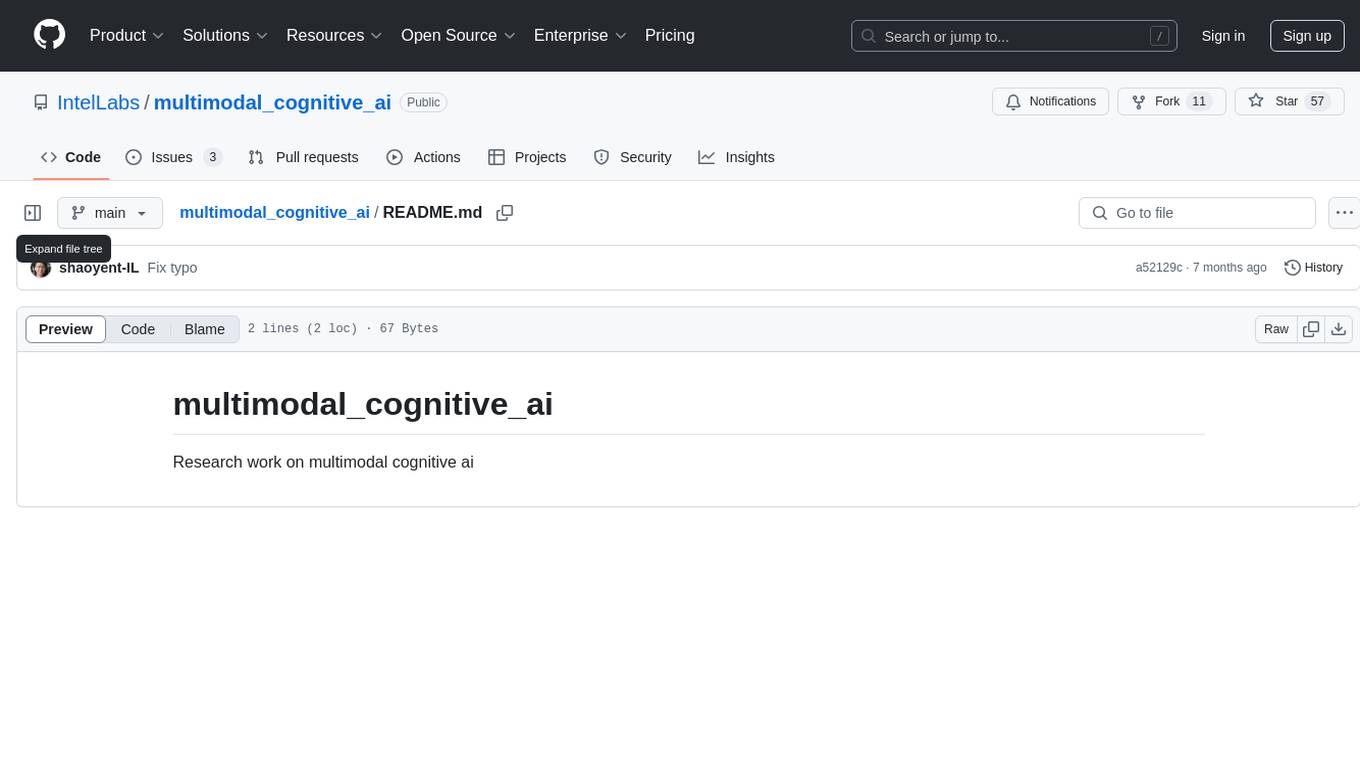
multimodal_cognitive_ai
The multimodal cognitive AI repository focuses on research work related to multimodal cognitive artificial intelligence. It explores the integration of multiple modes of data such as text, images, and audio to enhance AI systems' cognitive capabilities. The repository likely contains code, datasets, and research papers related to multimodal AI applications, including natural language processing, computer vision, and audio processing. Researchers and developers interested in advancing AI systems' understanding of multimodal data can find valuable resources and insights in this repository.
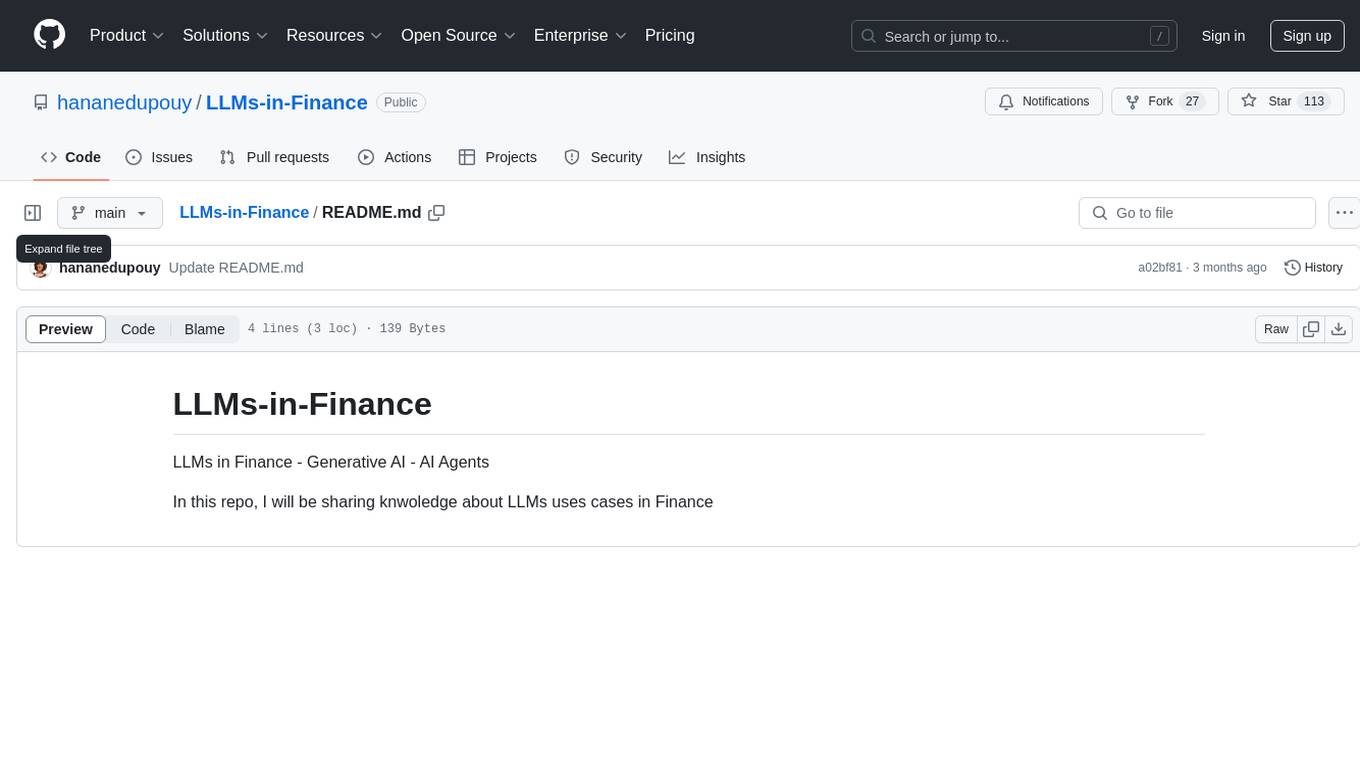
LLMs-in-Finance
This repository focuses on the application of Large Language Models (LLMs) in the field of finance. It provides insights and knowledge about how LLMs can be utilized in various scenarios within the finance industry, particularly in generating AI agents. The repository aims to explore the potential of LLMs to enhance financial processes and decision-making through the use of advanced natural language processing techniques.
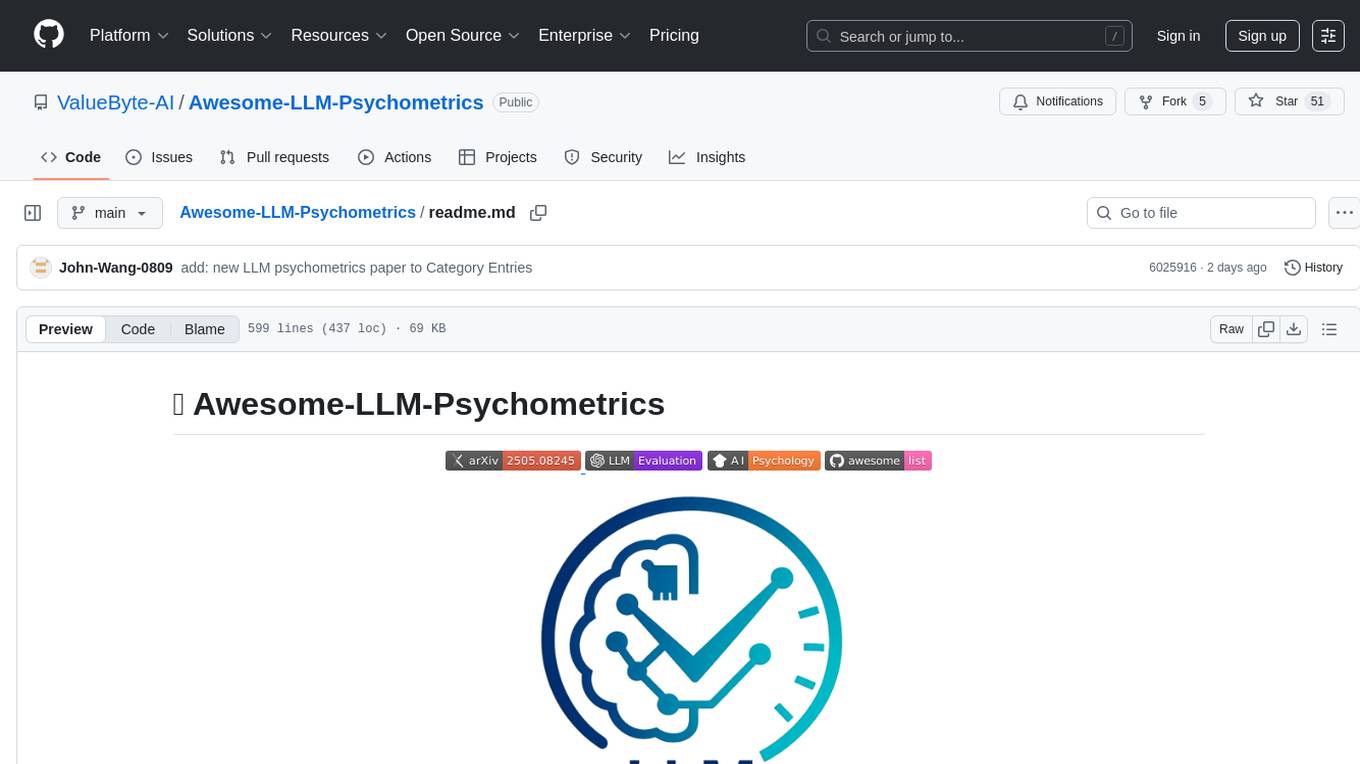
Awesome-LLM-Psychometrics
This repository contains a collection of tools and resources for conducting psychometric analysis in the context of latent variable modeling. It includes scripts for data preprocessing, model estimation, and results interpretation. The tools provided here aim to assist researchers and practitioners in the field of psychology and related disciplines to analyze complex relationships among latent variables using advanced statistical techniques.
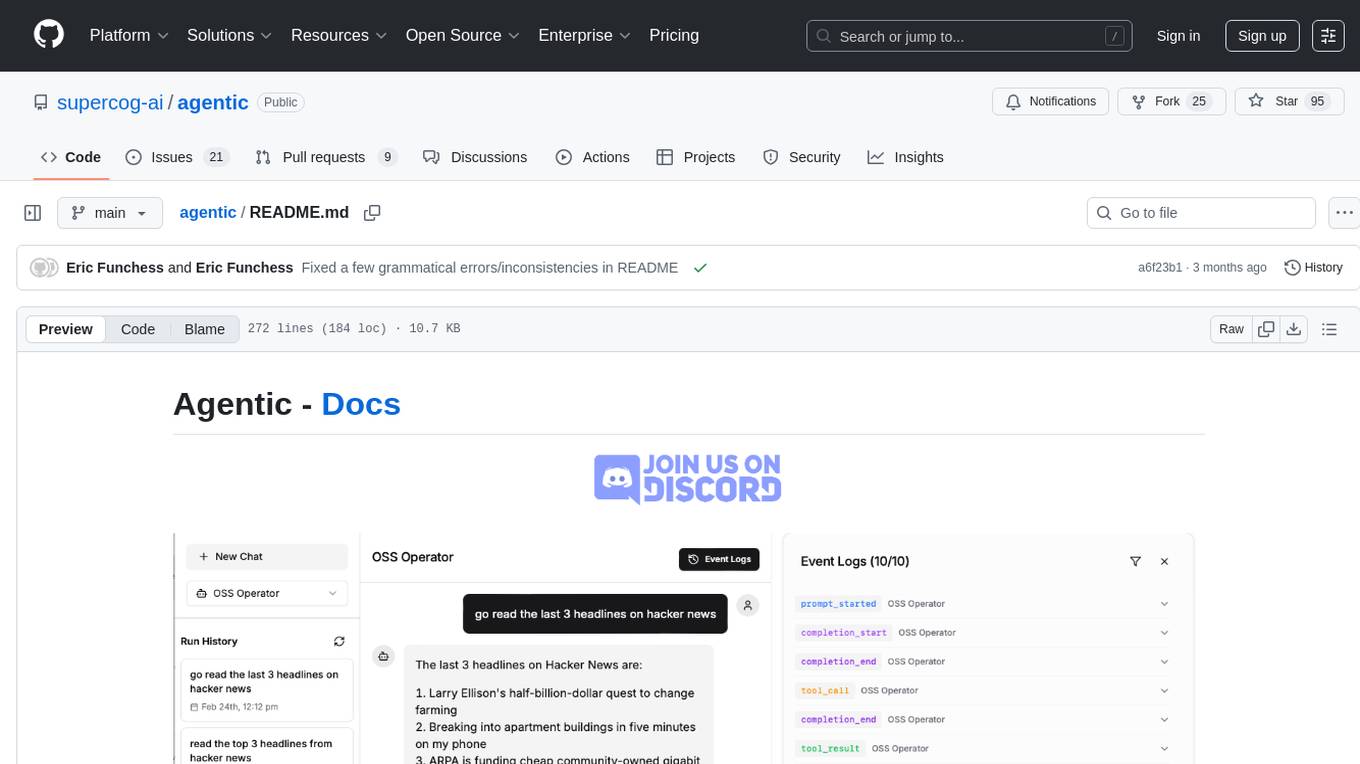
agentic
Agentic is a lightweight and flexible Python library for building multi-agent systems. It provides a simple and intuitive API for creating and managing agents, defining their behaviors, and simulating interactions in a multi-agent environment. With Agentic, users can easily design and implement complex agent-based models to study emergent behaviors, social dynamics, and decentralized decision-making processes. The library supports various agent architectures, communication protocols, and simulation scenarios, making it suitable for a wide range of research and educational applications in the fields of artificial intelligence, machine learning, social sciences, and robotics.
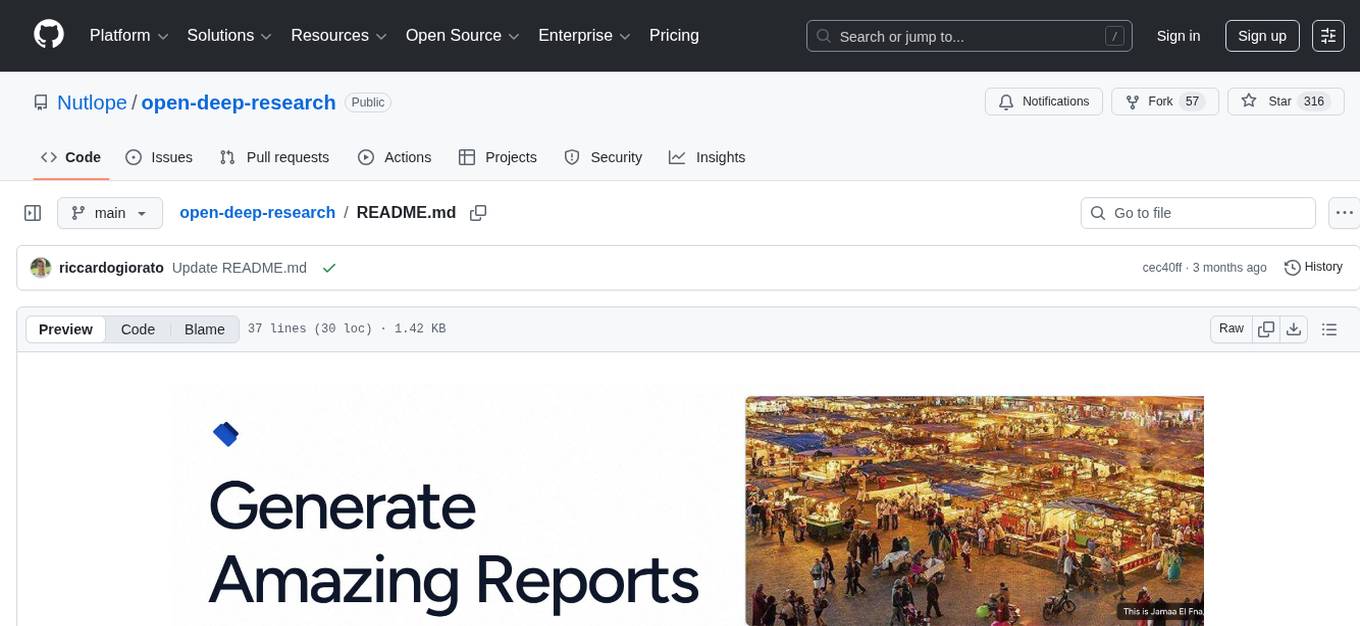
open-deep-research
Open Deep Research is a comprehensive repository that provides resources, tools, and information for deep learning research. It includes datasets, pre-trained models, code implementations, research papers, and tutorials to support researchers and developers in the field of deep learning. The repository aims to facilitate collaboration, knowledge sharing, and innovation in the deep learning community.
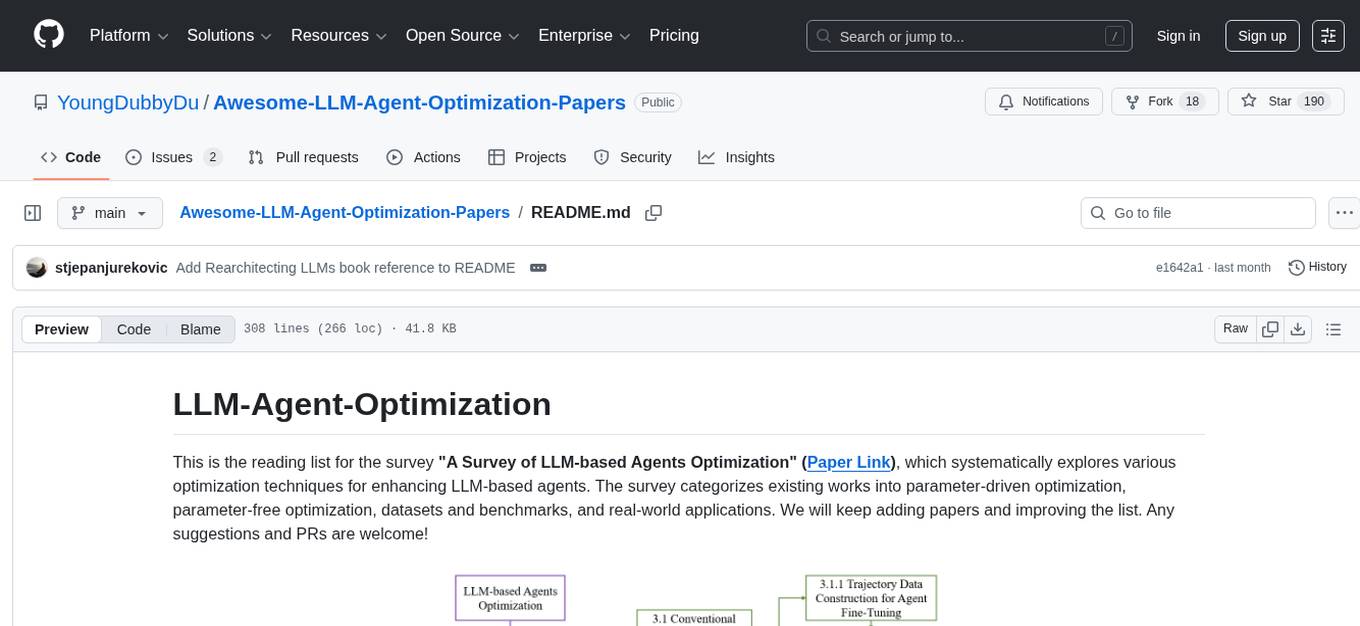
Awesome-LLM-Agent-Optimization-Papers
This repository contains a curated list of papers related to agent optimization in reinforcement learning. It includes research papers, articles, and resources that focus on improving the performance of agents in various environments through optimization techniques. The collection covers a wide range of topics such as policy optimization, reward shaping, exploration strategies, and more. Whether you are a researcher, student, or practitioner in the field of reinforcement learning, this repository serves as a valuable resource to stay updated on the latest advancements and best practices in agent optimization.
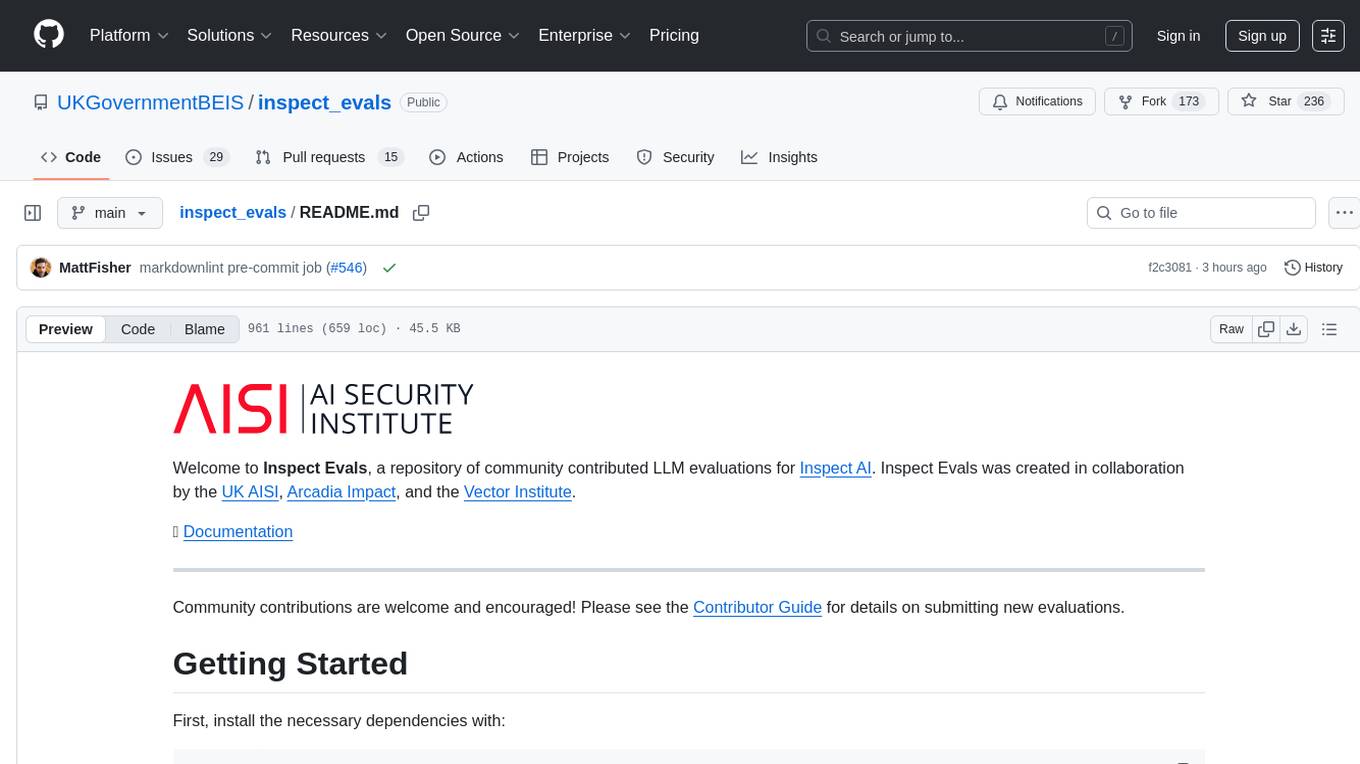
inspect_evals
Inspect Evals is a repository of community-contributed LLM evaluations for Inspect AI, created in collaboration by the UK AISI, Arcadia Impact, and the Vector Institute. It supports many model providers including OpenAI, Anthropic, Google, Mistral, Azure AI, AWS Bedrock, Together AI, Groq, Hugging Face, vLLM, and Ollama. Users can contribute evaluations, install necessary dependencies, and run evaluations for various models. The repository covers a wide range of evaluation tasks across different domains such as coding, assistants, cybersecurity, safeguards, mathematics, reasoning, knowledge, scheming, multimodal tasks, bias evaluation, personality assessment, and writing tasks.
For similar tasks
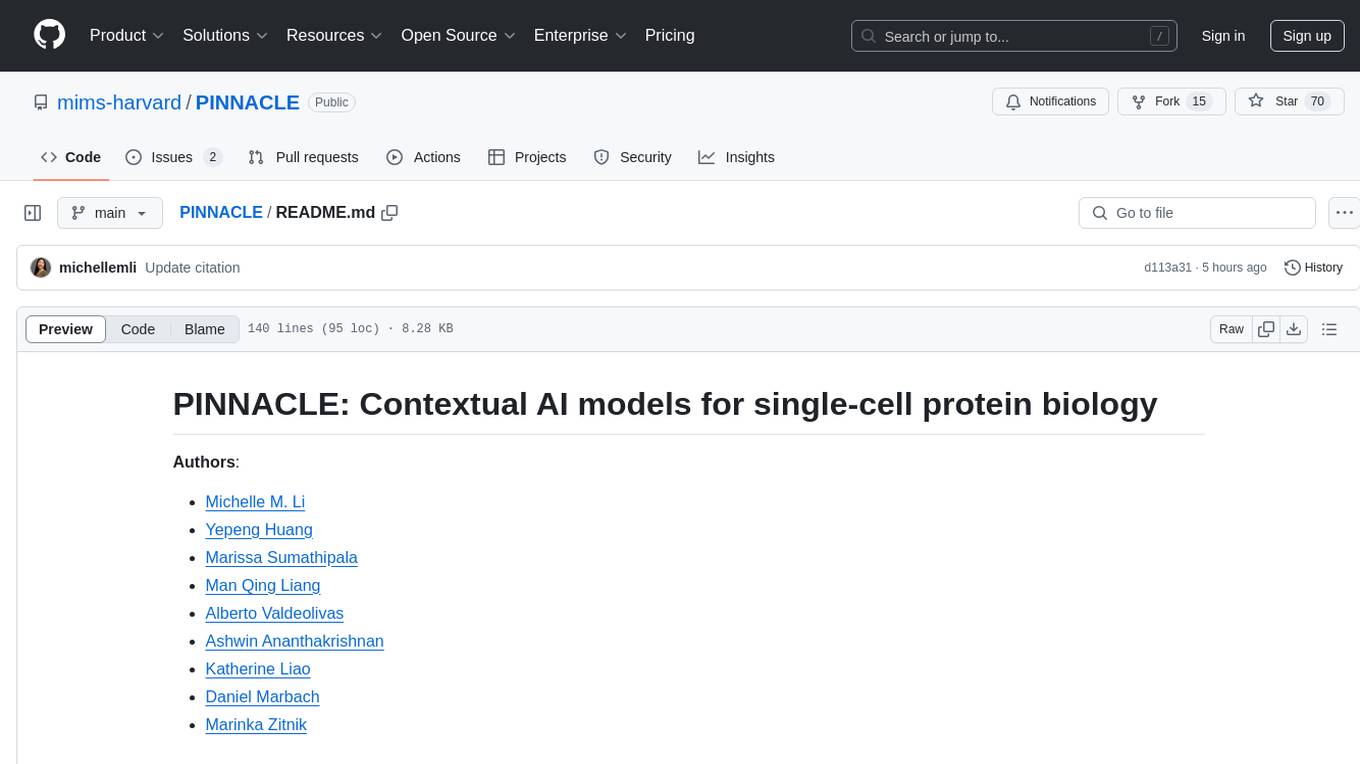
PINNACLE
PINNACLE is a flexible geometric deep learning approach that trains on contextualized protein interaction networks to generate context-aware protein representations. It provides protein representations split across various cell-type contexts from different tissues and organs. The tool can be fine-tuned to study the genomic effects of drugs and nominate promising protein targets and cell-type contexts for further investigation. PINNACLE exemplifies the paradigm of incorporating context-specific effects for studying biological systems, especially the impact of disease and therapeutics.

ToolUniverse
ToolUniverse is a collection of 211 biomedical tools designed for Agentic AI, providing access to biomedical knowledge for solving therapeutic reasoning tasks. The tools cover various aspects of drugs and diseases, linked to trusted sources like US FDA-approved drugs since 1939, Open Targets, and Monarch Initiative.
For similar jobs
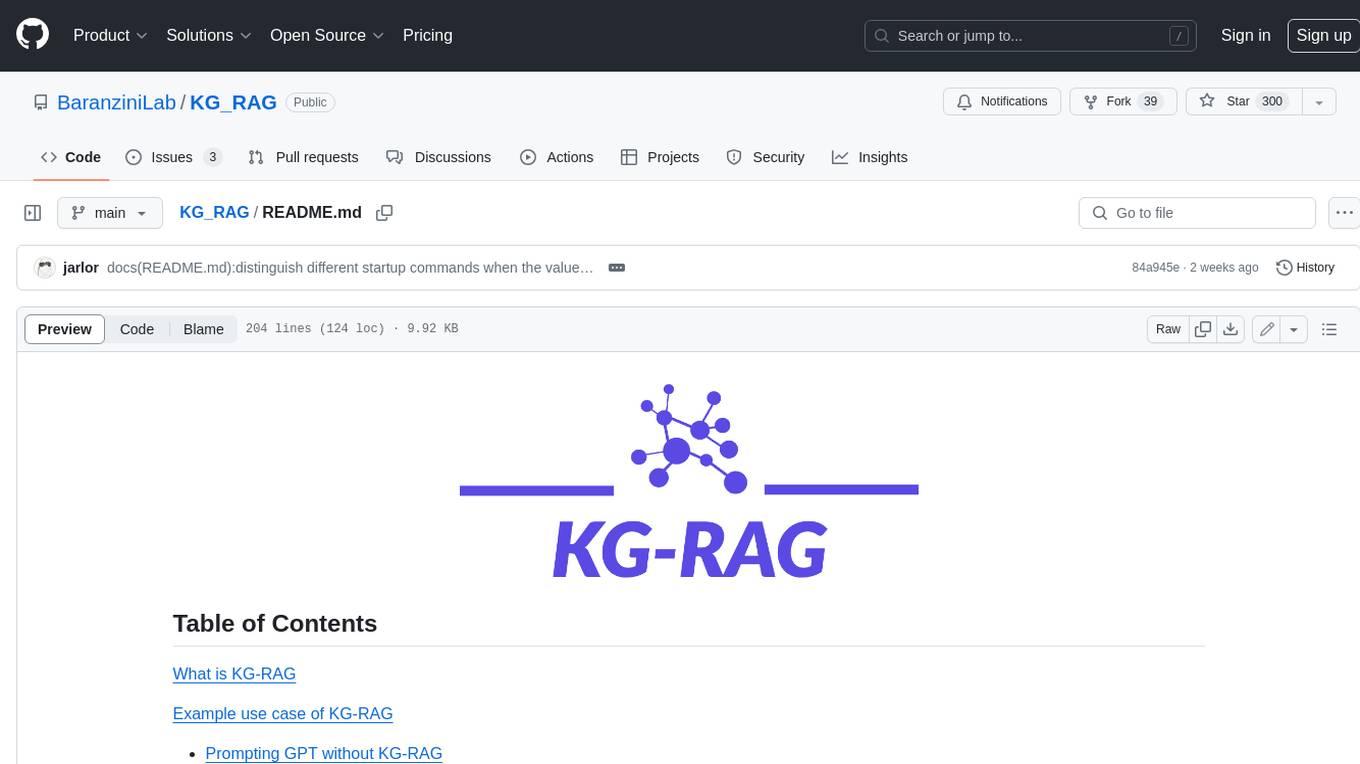
KG_RAG
KG-RAG (Knowledge Graph-based Retrieval Augmented Generation) is a task agnostic framework that combines the explicit knowledge of a Knowledge Graph (KG) with the implicit knowledge of a Large Language Model (LLM). KG-RAG extracts "prompt-aware context" from a KG, which is defined as the minimal context sufficient enough to respond to the user prompt. This framework empowers a general-purpose LLM by incorporating an optimized domain-specific 'prompt-aware context' from a biomedical KG. KG-RAG is specifically designed for running prompts related to Diseases.
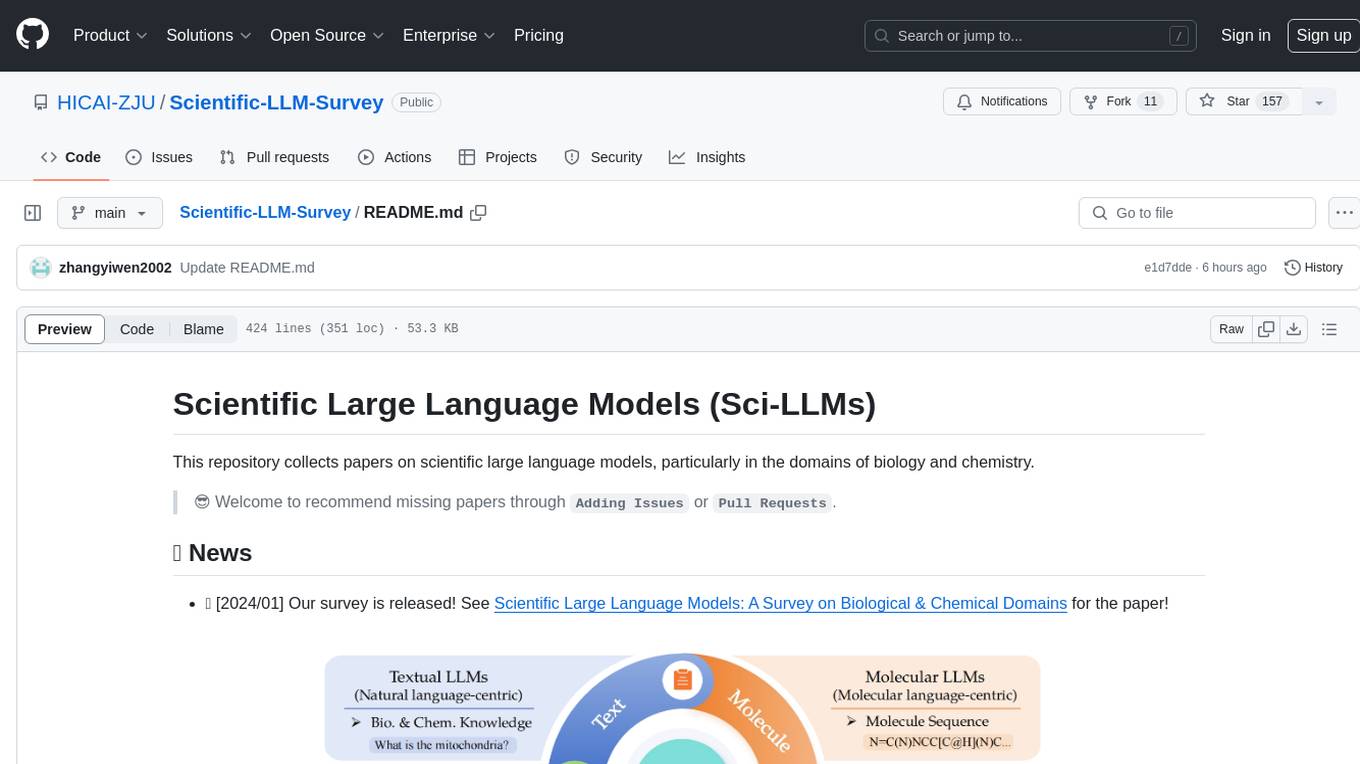
Scientific-LLM-Survey
Scientific Large Language Models (Sci-LLMs) is a repository that collects papers on scientific large language models, focusing on biology and chemistry domains. It includes textual, molecular, protein, and genomic languages, as well as multimodal language. The repository covers various large language models for tasks such as molecule property prediction, interaction prediction, protein sequence representation, protein sequence generation/design, DNA-protein interaction prediction, and RNA prediction. It also provides datasets and benchmarks for evaluating these models. The repository aims to facilitate research and development in the field of scientific language modeling.

biochatter
Generative AI models have shown tremendous usefulness in increasing accessibility and automation of a wide range of tasks. This repository contains the `biochatter` Python package, a generic backend library for the connection of biomedical applications to conversational AI. It aims to provide a common framework for deploying, testing, and evaluating diverse models and auxiliary technologies in the biomedical domain. BioChatter is part of the BioCypher ecosystem, connecting natively to BioCypher knowledge graphs.
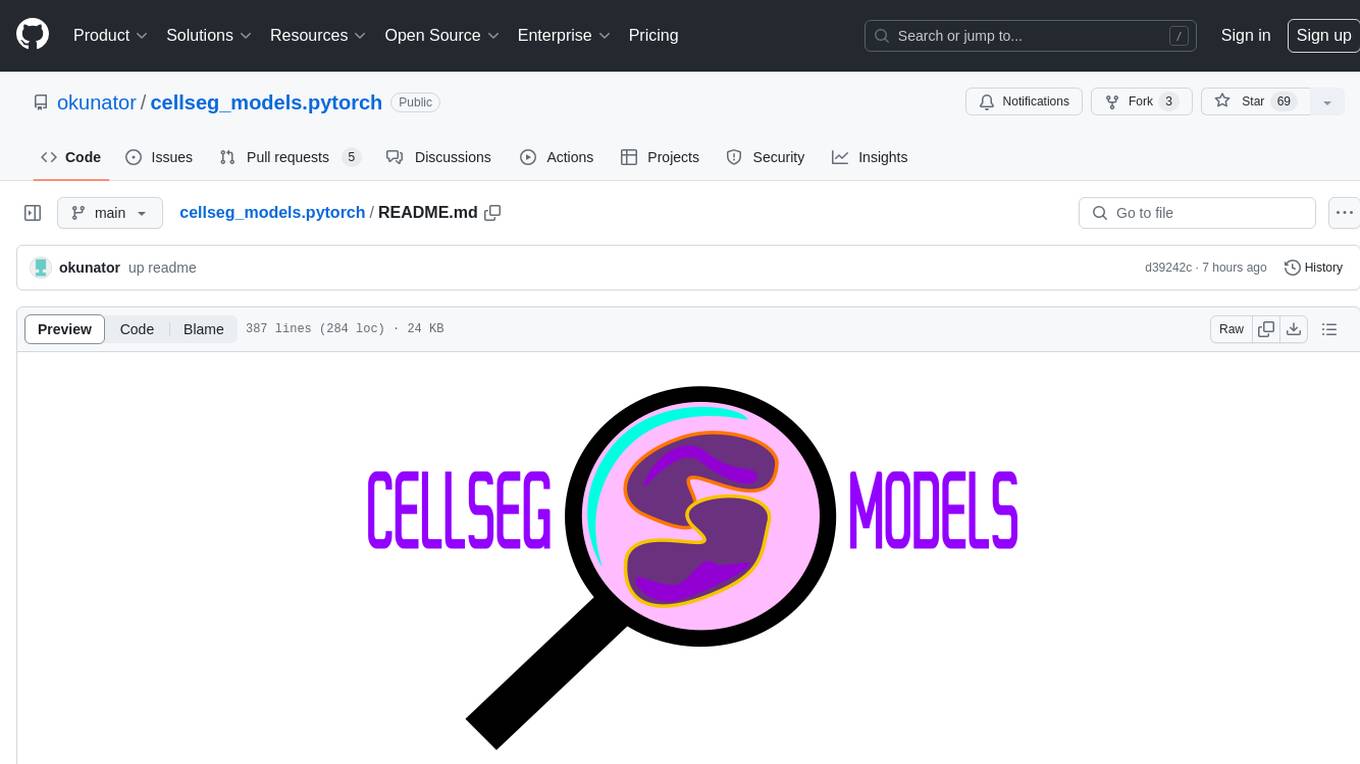
cellseg_models.pytorch
cellseg-models.pytorch is a Python library built upon PyTorch for 2D cell/nuclei instance segmentation models. It provides multi-task encoder-decoder architectures and post-processing methods for segmenting cell/nuclei instances. The library offers high-level API to define segmentation models, open-source datasets for training, flexibility to modify model components, sliding window inference, multi-GPU inference, benchmarking utilities, regularization techniques, and example notebooks for training and finetuning models with different backbones.
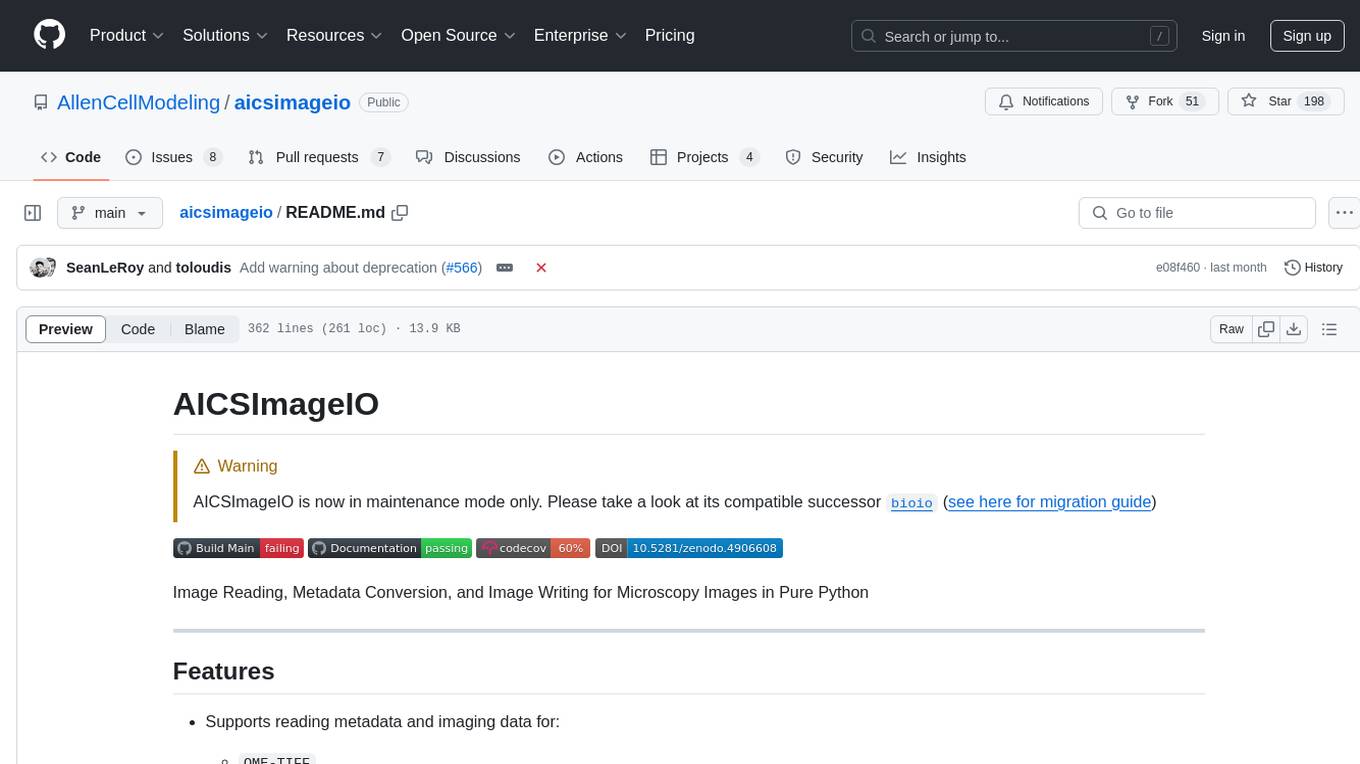
aicsimageio
AICSImageIO is a Python tool for Image Reading, Metadata Conversion, and Image Writing for Microscopy Images. It supports various file formats like OME-TIFF, TIFF, ND2, DV, CZI, LIF, PNG, GIF, and Bio-Formats. Users can read and write metadata and imaging data, work with different file systems like local paths, HTTP URLs, s3fs, and gcsfs. The tool provides functionalities for full image reading, delayed image reading, mosaic image reading, metadata reading, xarray coordinate plane attachment, cloud IO support, and saving to OME-TIFF. It also offers benchmarking and developer resources.
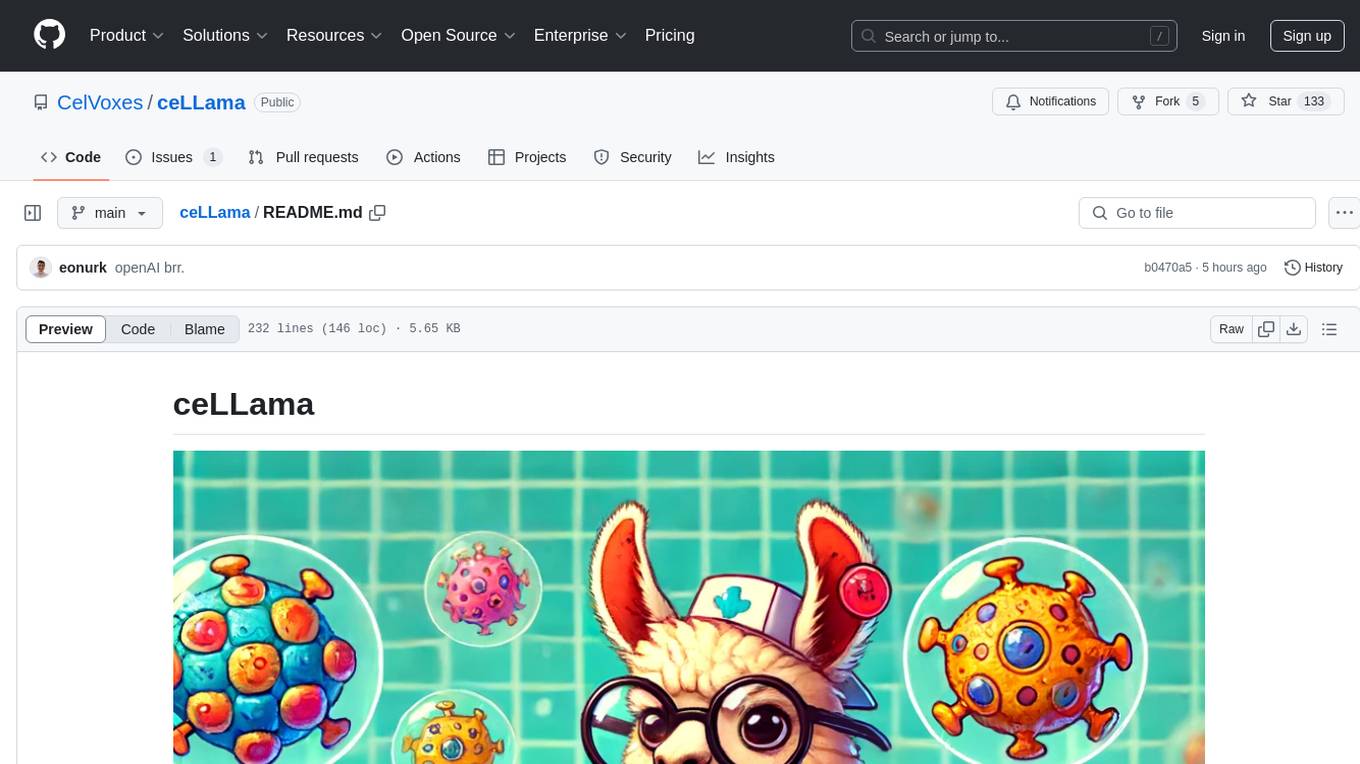
ceLLama
ceLLama is a streamlined automation pipeline for cell type annotations using large-language models (LLMs). It operates locally to ensure privacy, provides comprehensive analysis by considering negative genes, offers efficient processing speed, and generates customized reports. Ideal for quick and preliminary cell type checks.

PINNACLE
PINNACLE is a flexible geometric deep learning approach that trains on contextualized protein interaction networks to generate context-aware protein representations. It provides protein representations split across various cell-type contexts from different tissues and organs. The tool can be fine-tuned to study the genomic effects of drugs and nominate promising protein targets and cell-type contexts for further investigation. PINNACLE exemplifies the paradigm of incorporating context-specific effects for studying biological systems, especially the impact of disease and therapeutics.
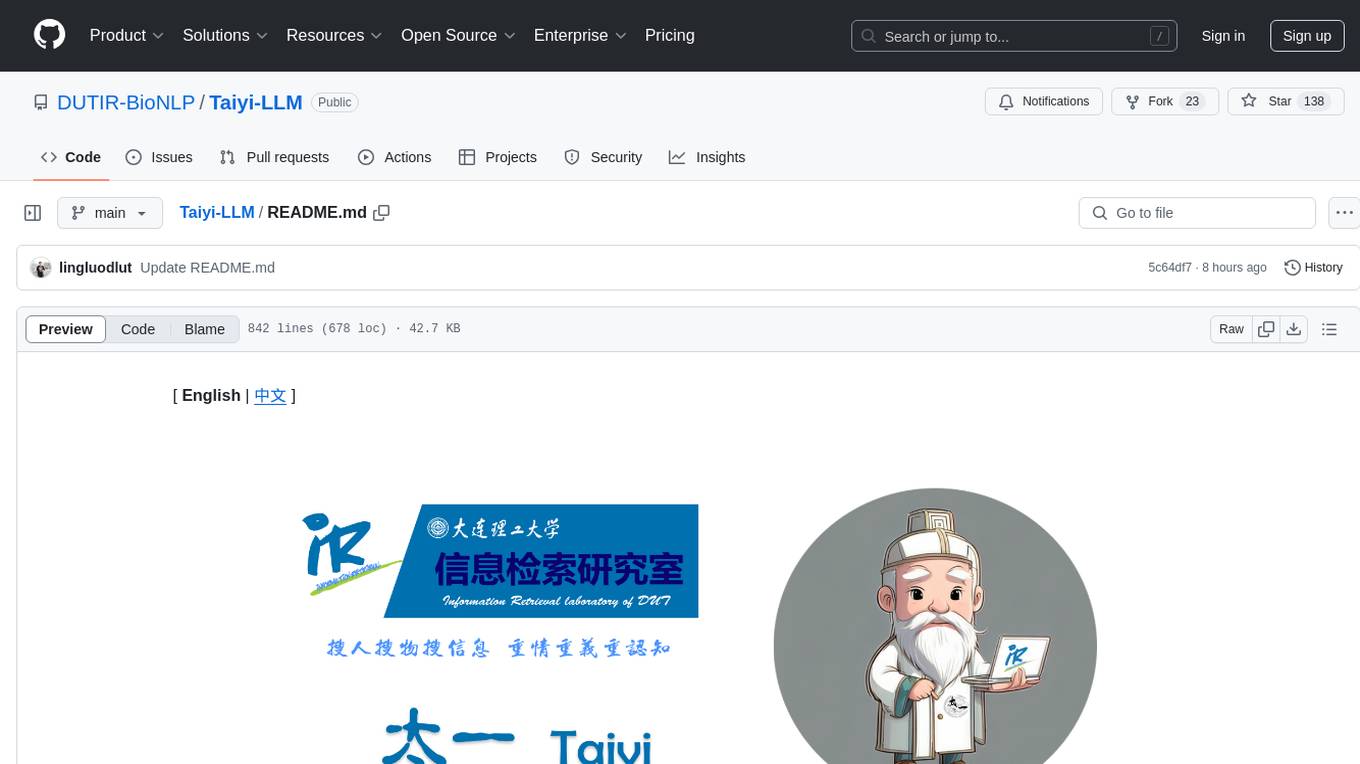
Taiyi-LLM
Taiyi (太一) is a bilingual large language model fine-tuned for diverse biomedical tasks. It aims to facilitate communication between healthcare professionals and patients, provide medical information, and assist in diagnosis, biomedical knowledge discovery, drug development, and personalized healthcare solutions. The model is based on the Qwen-7B-base model and has been fine-tuned using rich bilingual instruction data. It covers tasks such as question answering, biomedical dialogue, medical report generation, biomedical information extraction, machine translation, title generation, text classification, and text semantic similarity. The project also provides standardized data formats, model training details, model inference guidelines, and overall performance metrics across various BioNLP tasks.








